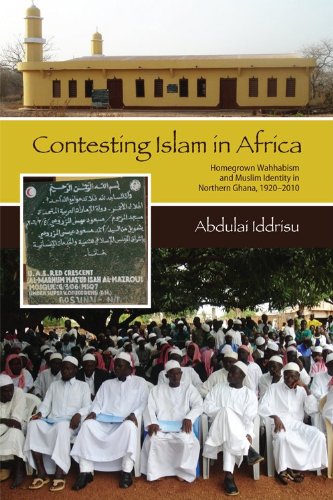
Contesting Islam in Africa: Homegrown Wahhabism and Muslim Identity in Northern Ghana PDF
296 Pages·2012·6.1316 MB·other
Most books are stored in the elastic cloud where traffic is expensive. For this reason, we have a limit on daily download.
Preview Contesting Islam in Africa: Homegrown Wahhabism and Muslim Identity in Northern Ghana
Description:
Contesting Islam in Africa examines the experiences of “returnee” scholars, an emerging class of elites trained in Saudi and Egyptian theological universities, and their role in educational initiatives and the reconfiguration of Muslim identity in Ghana between 1920 and 2010. Based on oral interviews and significant archival work in Ghana and at the National Archives in London, the book addresses three questions: How did the returnee scholars conceptualize and rationalize local politics and Muslim life in a pluralistic society where Muslims are a minority? How did Ghana's colonial and post-colonial governments react to the transnational spaces constructed by Muslims generally? And, given the returnee educational imperative, what has been the Saudi and Egyptian influence on the formulation of Muslim culture in Ghana? The book also explores the influence of local mallams, in particular Alhaji Yussif Soalihu (Afa Ajura), who was indefatigable as he almost single-handedly spread Wahhabism in Ghana. For any meaningful understanding of reform Islam and the “returnee” scholars in Ghana, its essential to appreciate the many facets of the life of Afa Ajura. The activities of Afa Ajura and his literate assistants created public controversy and sometimes led to open confrontation with religious adversaries, the Tijaniyya fraternity. These activities redefined intra-religious conflagration and turned Afa Ajura into a religious phenomenon. The many violent confrontations that ensued also attracted the attention of external actors not only interested in spreading reform Islam, but also interested in integrating Ghanaian Muslims into the wider world of Islam. This book argues that Salafism/Wahhabism was and in many ways remains a homegrown religious phenomenon that benefitted primarily from preexisting splits within the northern Ghanaian Muslim community. It also argues that transnational Salafism/Wahhabism and Middle Eastern and North African contact—especially through education and outreach programs—only provided the ideological justification and the grammar for reinterpreting the common good and for reconfiguring local social and political sensibilities. This book is part of the African World Series, edited by Toyin Falola, Frances Higginbotham Nalle Centennial Professor in History, University of Texas at Austin.
See more
The list of books you might like
Most books are stored in the elastic cloud where traffic is expensive. For this reason, we have a limit on daily download.
